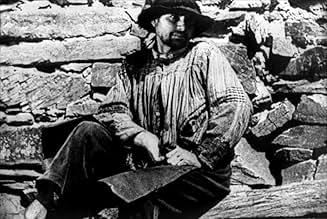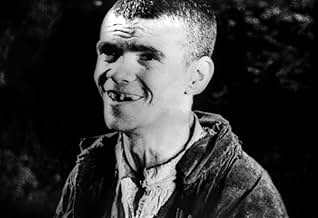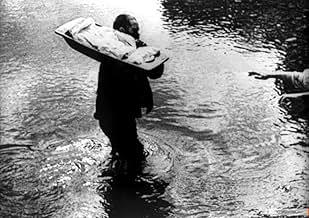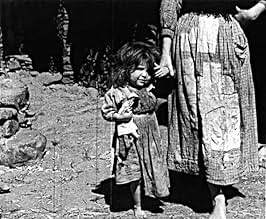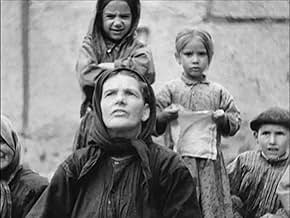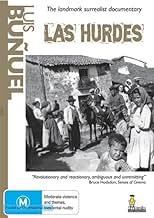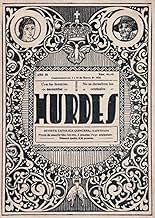NOTE IMDb
7,3/10
6,5 k
MA NOTE
Aucune route ne mène aux 'Hurdes', une région oubliée du monde et même des Espagnols. Les enfants sales y vont pieds nus. S'épuisant à gratter une terre hostile les gens meurent tôt de malnu... Tout lireAucune route ne mène aux 'Hurdes', une région oubliée du monde et même des Espagnols. Les enfants sales y vont pieds nus. S'épuisant à gratter une terre hostile les gens meurent tôt de malnutrition et de paludisme. Crétins ou goîtreux, personne ne chante. [255]Aucune route ne mène aux 'Hurdes', une région oubliée du monde et même des Espagnols. Les enfants sales y vont pieds nus. S'épuisant à gratter une terre hostile les gens meurent tôt de malnutrition et de paludisme. Crétins ou goîtreux, personne ne chante. [255]
- Réalisation
- Scénario
- Casting principal
Avis à la une
10groveman
I found it very interesting reading the reactions of others here, from interpreting this as everything from a pure comedy to a pure documentary. The truth is that it denies classification, and for many that just simply does not compute. Therefore, it has obviously done exactly what Bunuel wanted.
The aim of surrealism is to lure you in with the trap of a conventional narrative, and then hit you right in the face with something impossible to just passively accept. This film is the perfect example of this. You are absolutely forced into the role of active observer; forced to draw your own conclusions. Independent thought is pulled to the surface, returning comprehension to it's original purity. Reality lies not in what you are seeing, and not in what you are hearing, but somewhere in-between.
My God, this man was a genius, and so far ahead of his time it's unbelievable. Spielberg shows you what you want to see. Bunuel shows you what you need to see. Find this film and see it. Its value is incalculable.
The aim of surrealism is to lure you in with the trap of a conventional narrative, and then hit you right in the face with something impossible to just passively accept. This film is the perfect example of this. You are absolutely forced into the role of active observer; forced to draw your own conclusions. Independent thought is pulled to the surface, returning comprehension to it's original purity. Reality lies not in what you are seeing, and not in what you are hearing, but somewhere in-between.
My God, this man was a genius, and so far ahead of his time it's unbelievable. Spielberg shows you what you want to see. Bunuel shows you what you need to see. Find this film and see it. Its value is incalculable.
I saw this movie with absolutely no idea what it would be about or when this movie was made, only that it was made by Luis Bunuel, and I felt I HAD to at least have seen 1 movie made by the man so many people see as one of the many movie gods.
I must add that before seeing Las Hurdes ("Land Without Bread") in the theatre where I saw it, they had programmed the documentary "Bunuel's Prisoners". In which the people of the Hurdes region comment on the movie and the circumstances under which this movie came to be. This movie gave me enough information to watch the main feature (Las Hurdes) with a much more realistic view than if I had seen this movie without seeing the doumentary first.
In the documentary several people express their annoyance and irritation with the manner in which Bunuel has twisted and fabricated some of the scenes in the actual movie/documentary. The goat falling from the cliff is not exactly falling per accident and the "dead" baby in one of the last scenes is not dead at all (this can be seen by watching the moving chest of the baby).
All in all I enjoyed this slightly fictional documentary very much and I recommend everybody to go see it. It will either make you laugh out loud at times and leave you deeply disturbed at other times.
A must for people who are not allergic to foreign movies from before WW2. 9/10
I must add that before seeing Las Hurdes ("Land Without Bread") in the theatre where I saw it, they had programmed the documentary "Bunuel's Prisoners". In which the people of the Hurdes region comment on the movie and the circumstances under which this movie came to be. This movie gave me enough information to watch the main feature (Las Hurdes) with a much more realistic view than if I had seen this movie without seeing the doumentary first.
In the documentary several people express their annoyance and irritation with the manner in which Bunuel has twisted and fabricated some of the scenes in the actual movie/documentary. The goat falling from the cliff is not exactly falling per accident and the "dead" baby in one of the last scenes is not dead at all (this can be seen by watching the moving chest of the baby).
All in all I enjoyed this slightly fictional documentary very much and I recommend everybody to go see it. It will either make you laugh out loud at times and leave you deeply disturbed at other times.
A must for people who are not allergic to foreign movies from before WW2. 9/10
I have ancestors from my father side who are originally from Las Hurdes. The highlands were exactly like the documentary film portrays them. The lowlands slightly better off, The documentary helped them because the world focused on them and offered some help. Finally a cementery was built and food imported. Problem is the civil war that followed shortly afterwards. Buñuel was a surrealist film director who tried to shift towards realism after joining the communist party. The civil war against communists and fascists further increased poverty but no films were allowed for decades under the dictatorship 1936-1975
Luis Buñuel's approach to film-making was so unusual, and his intentions so hard to decipher, that you can never be quite sure what his movies were meant to convey. So it should probably not be too surprising that even when he makes a documentary it is still hard to tell exactly what he was doing. While this gives every initial appearance of being a straightforward documentary, it is not long before Buñuel's detailed yet surrealistic approach begins to show in subtle ways.
Whatever else may be true, it is an unusual film, and a generally interesting one. It is also unsettling - at times, very much so. It depicts a civilization that, though located in the midst of Spain just before the Franco era, could almost be from pre-historic times. Many of the images and much of the commentary are disturbing and uncomfortable to watch, to say the least. Yet the tone is far from emotional, and in fact it seems to be deliberately withdrawn, even unsympathetic, much of the time.
At the same time, it's easy to see why there are those who suggest that Buñuel was not filming a strictly objective documentary. While there are no outlandish or fantastical images, his distinctive style shows up in less obvious ways, through odd details and sequences. There also seem to be a number of different versions of the narration, which do not always cast events in the same light. So, as so often tends to be the cast with Buñuel, all that you can do is to watch it for yourself and then make your best guess as to what it all means.
Whatever else may be true, it is an unusual film, and a generally interesting one. It is also unsettling - at times, very much so. It depicts a civilization that, though located in the midst of Spain just before the Franco era, could almost be from pre-historic times. Many of the images and much of the commentary are disturbing and uncomfortable to watch, to say the least. Yet the tone is far from emotional, and in fact it seems to be deliberately withdrawn, even unsympathetic, much of the time.
At the same time, it's easy to see why there are those who suggest that Buñuel was not filming a strictly objective documentary. While there are no outlandish or fantastical images, his distinctive style shows up in less obvious ways, through odd details and sequences. There also seem to be a number of different versions of the narration, which do not always cast events in the same light. So, as so often tends to be the cast with Buñuel, all that you can do is to watch it for yourself and then make your best guess as to what it all means.
Bunuel had always been a visionary man,his cinema had never stopped trying from "un chien andalou" to "le fantôme de la liberté"."las Hurdes " was a documentary ,but it made the genre explode.And,to think it was seventy years ago!
Near the Portuguese border,there's a part of Spain where a doomed humanity used to live.The beginning of "las hurdes" deals with a feast in a village,last stop before the Hurdes country.
Then Bunuel begins his unthinkable depiction of this subhumanity:morons,maimed persons,monsters with twelve fingers,living in a filth you could not imagine.They drink in the brook/sewer!Springtime which everybody enjoys elsewhere is the worst season for the "Hurdes":all that remains for them to eat is cherries.But they cannot wait that they ripen,so they contract dysentery and they fall like flies.
And ,however,in a world that God seems to have completely forgotten,the children learn at school that the sum of the angles of a triangle is 180 degrees.And chiefly,they must respect the property of others(!). On the wall of the classroom,you can see a picture,showing an eighteen century marchioness!
Irony and surrealism are always here .After these horrors,out of the blue,Bunuel begins a lecture on the anopheles mosquito,complete with anatomical charts.
Banned by the Spanish government in 1933-1935,it took the Popular front(1936)to release what was the first social and political documentary.
Near the Portuguese border,there's a part of Spain where a doomed humanity used to live.The beginning of "las hurdes" deals with a feast in a village,last stop before the Hurdes country.
Then Bunuel begins his unthinkable depiction of this subhumanity:morons,maimed persons,monsters with twelve fingers,living in a filth you could not imagine.They drink in the brook/sewer!Springtime which everybody enjoys elsewhere is the worst season for the "Hurdes":all that remains for them to eat is cherries.But they cannot wait that they ripen,so they contract dysentery and they fall like flies.
And ,however,in a world that God seems to have completely forgotten,the children learn at school that the sum of the angles of a triangle is 180 degrees.And chiefly,they must respect the property of others(!). On the wall of the classroom,you can see a picture,showing an eighteen century marchioness!
Irony and surrealism are always here .After these horrors,out of the blue,Bunuel begins a lecture on the anopheles mosquito,complete with anatomical charts.
Banned by the Spanish government in 1933-1935,it took the Popular front(1936)to release what was the first social and political documentary.
Le saviez-vous
- AnecdotesLuis Buñuel was not above slaughtering several animals to deliver his message; he ordered the ailing donkey to be spread with honey so he could film it being stung to death by bees. Nor was the mountain goat falling off the mountain an accident, shot by Buñuel's crew for the desired sequence.
- GaffesIn the sequence where the mountain goat falls to its death, a puff of smoke can be seen on the side of the screen. This is from a gunshot by a crew member, who shot the goat so that it would fall and be filmed as if it 'accidentally' fell off of the mountain.
- ConnexionsFeatured in Histoire(s) du cinéma: Les signes parmi nous (1999)
Meilleurs choix
Connectez-vous pour évaluer et suivre la liste de favoris afin de recevoir des recommandations personnalisées
Détails
- Date de sortie
- Pays d’origine
- Langue
- Aussi connu sous le nom de
- Land Without Bread
- Lieux de tournage
- La Alberca, Salamanca, Castilla y León, Espagne(main town, on location)
- Société de production
- Voir plus de crédits d'entreprise sur IMDbPro
- Durée
- 30min
- Couleur
- Mixage
- Rapport de forme
- 1.37 : 1
Contribuer à cette page
Suggérer une modification ou ajouter du contenu manquant

